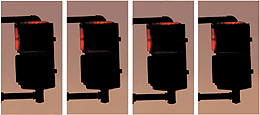So, the game's afoot. Nick Clegg today launched perhaps the most fascinating political battle of modern times when announcing the referendum on AV.
It's interesting because it's rare for a government to call for a referendum on a change that it doesn't actually agree with. They'll normally only give us a vote on anything if it's something they want and if they think they've got a decent chance of winning. Yet most members of the government do not want AV, and will campaign against it, and we'll have the spectacle of members of the same Cabinet openly taking opposite sides of the argument.
The Womble doesn't want AV either, and would campaign against it if he could be arsed. There is no perfect voting system, but first-past-the-post delivers strong government more often than not and seems preferable to all the alternatives as far as I can see. Whilst this coalition is working so far, it probably won't last and in any proportional system there is always the danger of simply lurching from one failed coalition to the next, with the centre party holding a level of power that their electoral support simply does not justify. In addition to which - and this is important - the comedy value to be had from Clegg being defeated on this would be immense. Just the prospect of seeing the look on his face in the wake of a crushing defeat surely renders any serious constitutional debate on this redundant. The British public should apply a "sense of humour" factor and reject AV just for the sheer fun of it.
There seems to be a bit of a set-to going on about the date for the referendum; the most persuasive argumnent in favour of 7th May is that it annoys the Welsh, and that swings it for me.
That aside, we have the the proposal to reduce the number of MPs to 600 and equalise the number of voters in each constituency. This is a good thing, and will rain on a few socialist parades. Labour benefits greatly from having many of its strongholds in constituencies with relatively few voters so serve them bleeding well right if they lose a few MPs on the back of that being put right. Ditto the Scots; the average number of voters per Scottish seat is far lower than that in England.
And then there's this dissolution of Parliament business. You're going to have to excuse me here, because I must be being thick. As I understand it, when this idea was first announced, there was a row because Clegg wanted to raise the percentage of MPs needed to vote for a dissolution from 50, where it's been since the dawn of time, to 55. That meant that more than half of our elected MPs could vote for a disillusionment, but not actually get one. I'm pretty sure about this bit, and that there was a row, because I joined in. And now, somehow, it's supposed to be better, because the new proposal requires 66% of MPs to vote for dissolution. It must be because I'm just a simple voter and I don't read the Guardian, but I just cannot see for the life of me how this is any better.
Still, I suppose that's why Nick Clegg's running the country and I'm stuck watching people trying to mend computers.
Looking Forward To A Labour Conference
17 years ago







3 comments:
"the most persuasive argumnent in favour of 7th May is that it annoys the Welsh, and that swings it for me."
All your superbly thought-out stuff, yet this was the bit that tickled me. Shallow? Yes, sometimes. :)
Since we are to gather and decide a number of things none of give a hoot for - why not add a referendum for an English Parliament to the list?
That I would be out and about for, how about you?
There's an argument that says that First Past the Post delivers weak government, because it produces large disproportional majorities where the governing party can pretty much do whatever it wants, so weakening democratic scrutiny of government legislation. If you want an illustration of the validity of that argument, look no further than the last Labour government.
The point about raising the majority needed to dissolve parliament is that the previous 55% limit was set entirely for the convenience of the coalition government, which possesses 56% of the seats. So it could have decided to dissolve parliament if both parties agreed, making the parliamentary fixed term null and void.
Raising the limit to 66% overcomes this and is more consistent with the practice in other fixed-term parliaments, e.g. Scotland. However, my understanding is that if the government loses a no-confidence vote, the politicians have one month in which to form a new government. If they fail, parliament has to be dissolved anyway. Plus of course, if a majority of MPs decided to change the rules back to requiring an automatic dissolution of parliament in the event of a no-confidence vote, they could do so at any time.
Post a Comment